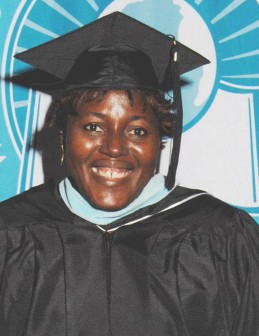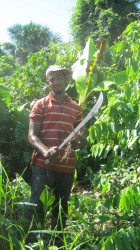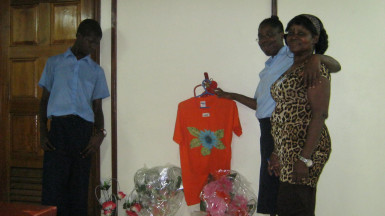They might be someone’s sister or brother or even parents. Some are professionals, others can be found on the streets begging. The reasons for their condition are many and varied; however, they are all human beings with emotions, potential and skills, many of which are never realized.

Being differently-abled is challenging and it often takes unwavering courage to face the fears, stigma and discrimination which comes not only from strangers but also relatives, some of whom were accused of abuse and neglect by forcing differently-abled family members to make the streets their home.
“Some of my friends died on the streets, they were raped, abused and killed while they lived on the streets,” Karen Hall, a lecturer at the University of Guyana (UG), who is also differently-abled, told Stabroek News recently.
According to Leon Walcott, the chairman of the Guyana Council of Organizations for Persons with Disabilities, the last census done in 2002 showed that Guyana has about 49, 000 persons who are living with some form of disability and that figure is likely to be higher now.
Walcott, who is also differently-abled is unable to walk and he moves around on a scooter. He said that 70-75% of persons living with a disability in Guyana, were not born that way.
At the launching of a six-year disability and rehabilitation plan under the previous administration at the Pegasus Hotel, Director of Rehabilitation Services Debita Harripersaud of the former Ministry of Health, disclosed that findings from the 2002 census showed that 6.4% of Guyanese were living with disabilities at that time.
According to Harripersaud, projections from that census suggests that over 50, 000 persons will be disabled by 2014. A number of situations – those institutionalized and persons with temporary disabilities – were not taken into consideration during the census and it was disclosed that some 200, 000 persons were living with some form of disability during that time.

According to the Pan American Health Organization/ World Health Organization website, 140 million people in the Americas are estimated to be living with some form of disability but only 3% have access to rehabilitation services. “Guyana, Mexico, and Chile are among countries in the region that have made progress in recent months in advancing the goals of the regional plan by making health and rehabilitation services more accessible, by improving data collection, and implementing a new, community-based model of rehabilitation services,” it says.
In November 2014, Guyana also launched a new National Rehabilitation Services Strategic Plan, PAHO said.
Meanwhile, Walcott in an article published in Stabroek News on April 28, outlined some achievements of Guyana over the past ten years. The country became a signatory to the United Nations Convention on the Rights of Persons with Disabili-ties in 2007 and ratified the Convention in 2013, he stated. In 2010, the Persons With Disabilities Act was passed by the National Assembly. In 2008, the Guyana Council of Organi-zations for Persons with Dis-abilities was established under the chairmanship of Walcott.

Walcott also outlined several state-run organisations that cater for differently-abled persons to pursue their education. These include the David Rose School for Handicapped Children, the Diamond Special Needs, New Amsterdam Special Needs, Open Doors Vocational Training Centre and the Ministry of Education’s Resource Unit for the Blind. Special education has been placed on the curriculum of the Cyril Potter College of Education, he said.
Stabroek News visited the Open Doors Vocational Training Centre on Friday last and spoke with several staff members.

Exposure
Avril Boston teaches craft and cookery. She said the school caters for ten students per class and she believes that the exposure benefits the students greatly. However, the teacher expressed concern over the volume of persons who are disabled and reside in the interior with no access to services or any form of health care. She believes that additional schools should have been made accessible for students from those areas.
At the moment, she said, the Centre falls under the Ministry of Public Health. While there is no problem with the supply of materials for the schools, Boston said she will be happy if the government can provide some sort of support in supplying snacks or meals for the students.
Another challenge is the need for transportation. While there is one minibus which transports students to their homes, students are often left to wait for a second trip since the bus has only 15 seats. The school currently has 34 students.
Walcott, a former teacher and journalist, lost his ability to walk about six years ago owing to polio he contracted when he was just six years old. While he suffered some amount of discrimination, Walcott related that he considers himself to be one of the fortunate ones as he was able to attend secondary school before pursuing his university education.
He now advocates for the rights of persons with disabilities and offers whatever assistance he is able to give to anyone seeking help. In an interview, he acknowledged that many differently-abled persons living outside of urban areas are often unheard of and receive little or no aid. He mentioned Regions 1, 7, 8 and 10 in this regard. Due to the distance as well as the cost and terrain, volunteers are often unable to reach these destinations, he said.
Walcott believes that much more financial aid is required to meet the needs of those unable to access services. An estimated $13.5M per year, he said, is required to meet the demands of differently-abled persons. How-ever, a total of $1.3M was given in 2013 while in 2014, only $500, 000 was granted. He said that no money has so far been received for 2015.
Since a week of observance for persons who are differently-abled will be held from November 29 to December 5, Walcott is hoping that government will give more thought to the issue and more cooperation and contributions can be garnered from different groups in support of differently-abled persons in Guyana.
Meantime, Hall, who was successful at obtaining an Organisa-tion of American States (OAS) scholarship to read for a degree in disability studies at Ryerson University in Canada is today passing on her knowledge as a lecturer at UG. She also won another OAS scholarship to read for a masters’ degree in online studies on disability at the Walden University in the US. While she worked at several places before, she has since settled at UG, lecturing in the area of Special Needs in the Faculty of Education.
While Hall’s life is an inspiration and a success story, she lamented the lack of a support system in Guyana for differently-abled persons.
Probation
Although she is a professional, she endured her share of humiliation from peers and relatives. “As a person who is differently-abled, you always have to be ahead of everything that you do…because people always believe that you are not capable or you are a burden to them…while most jobs will have a three months’ probation period, persons with disability never come off of probation, we are always on probation,” Hall said.
It should have been a time for celebration when she graduated from university but Hall said her feelings were more of relief rather than celebration, owing to the many obstacles that challenged her daily in reaching her goal.
While Guyana has a Disability Act and a Commission, Hall believes that it serves very little purpose since nothing is being done that will impact the lives of differently-abled persons. She strongly supports the placing of differently-abled persons to head the Commission and bodies that are responsible for differently-abled persons. The persons that are employed to head those groups are often heartless and only concerned about their title, she contended. “Those people that working on the Commission sees it as a job, but it is a heart issue,” Hall emphasised.
She said that while persons with disabilities often receive gifts and this is welcomed, what is needed is systems since the gifts are often short-lived. “If it is just a gift, it is useless…because for the past 20 years it’s like I’ve been hearing the same thing,” and nothing was put in place that actually helps persons with disabilities, she said.
“I need to know what system is in place to accommodate disabled persons who would have outlived their parents who used to be caring for them,” Hall questioned. She also highlighted the many who had to live on the streets because there is nowhere for them to go and be cared for.
The woman said she knows of a differently-abled boy who arms himself with four knives hidden at different locations on his wheel chair. “He said that he has four knives so that if two should be taken away, he will have another two to protect himself,” she related.
Hall uses prosthetic legs but she said she was never able to have them custom built to fully support her. Although she tried to discuss the issue with local technicians, she said her words fell on deaf ears. The ones that she receives locally bruise her and could be very discomforting, she said. Hall has since been buying the equipment she needs to aid her from international markets, making use of online shopping.
Hassle
She has also been trying to get a three-wheeled bike that will help in transporting her but the hassle with customs and the high taxes she has to pay is depressing, she said. Hall has also attempted to talk to a local mechanic to modify a bike that will suit her but she said the mechanic wanted a sum that was beyond the actual price to get the job done.
Hall said that the challenges that differently-abled persons face in Guyana are very depressing. Persons would sometimes see her struggling up a stair but will pay no heed or lend a helping hand or even open a door at times, she said.
At the end of the day, Hall said, she would feel physically tired and mentally drained. “It’s like every muscle in your body gets tired,” she related. She added that from the time she wakes, she will have to go through the entire day in her mind to ensure that she is mentally and physically prepared for it. “Sometimes if I have to go to certain places, I will go the day before just to make sure that I will be able to actually reach as a simple thing like an uneven surface may be a tremendous challenge,” she related.
Hall said she often practices prevention as the recovery period in the event of a fall is usually long. According to her, if she falls and injures her hip, it will keep hurting for about three months. “I learn balancing techniques and I am acquainted with all the bad corners and I plan ahead when I have to walk at any place,” she said.
Over the years, Hall has been shaping her environment to suit her. While she has a maid, she said, she will often have to remind her not to put things beyond her reach. Hall has done her bit in crusading for differently-abled persons and over the years, she said, she has grown tired after her voice seems not to matter to anyone. “I’ve written proposals and documents…I did everything I could do and have gotten no response…it’s like fighting a useless battle…I am tired of being inspired with my own disability…it is so expensive,” she stated.
At the moment, Hall said, living alone makes life easier for her as when she lived with relatives, persons often damaged her things with no consideration that she needs them for her survival. “Sometimes the children will push your chair and puncture the tire and nobody cares. I have to find a way to get it fixed,” she said.
The internet has been serving as an important tool for her as whenever she needs advice, it is easily accessible. When it sometimes becomes overbearing, Hall said she gains the courage to go on with life from the courage of her mother who never gave up on her and supported her wholeheartedly until her passing.
Meanwhile, the educator believes that the education system in Guyana does not cater for differently-abled children, as there are no trained personnel in the school system. “We don’t plan aggressively…if the government caters to train five teachers in the area of special needs every year, it will create an impact,” she opined. She added regular teachers should not be asked to teach special needs children since they often require special attention.
Hall said that in some countries, a special needs teacher along with another aide, are usually placed to work in a classroom with the regular teacher to ensure that the differently-abled children are given maximum attention. Since we are in an age of information technology, Hall believes that all the tools are available to meet the needs of differently-abled children.
However, the government often looks at the majority and ignore the needs of differently-abled persons as they are often a minority. Nevertheless, she is of the opinion that if government invests in the development of differently-abled persons, it will result in the development of the country as a whole as they can become independent and contribute to the improvement of themselves and the country, rather than being left in the care of relatives and the authorities.
One area in which Hall has seen some amount of sustainability is the services provided for the visually impaired. However, she believes its sustainability depends greatly on international support.
Meanwhile, Stabroek News met Aaron Ramadhin, 29, of Lookout, East Bank Essequibo in his farm last week. Ramadhin dropped out of school in the primary stage. In his teens, he began pursuing electrical engineering but his career came to an abrupt end one day when he was riding his bicycle to the workshop where he was being trained at Zeelugt, East Bank Essequibo. He was rammed by a speeding drunken driver.
Ramadhin never received any form of compensation from the driver who was not charged. He suffered a severe brain injury and was hospitalized for weeks as he was unconscious. He was eventually discharged in a paralyzed and unconscious state.
Since his mother had passed away, his sister cared for him and he eventually began regaining consciousness although the doctors had said that he would not have regained consciousness. Over the years, Ramadhin gradually improved and today he walks, although he finds it difficult to balance. However, he never allowed his condition to keep him in a state of self-pity. Today he plants his own farm and earns his own money.
Stabroek News met several others who are struggling but find ways to survive. Amongst them was Mahadai Wong, 56, a former schoolteacher, who was paralyzed when she was just a toddler, owing to polio. Today, she is the mother of four children and is also a grandmother. Mahadai never received any special aid from the government as she has toiled as if she didn’t have a disability. Besides teaching, she also worked as a farmer with her husband in her younger years. She resigned from teaching several years ago. However, she still works alongside her husband who is a pastor and often assists students with their assignments and homework at no charge. She also maintains a flower garden in her yard.





